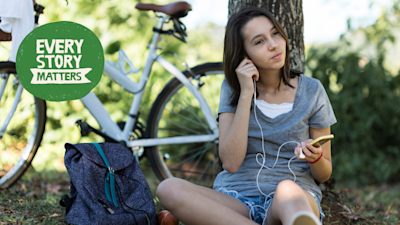Mental health and well-being in the lead-up to the Voice to Parliament.

Image: Fiona Cornforth is wearing hoop earrings, a black shirt and has her hair in a bun. There is a black wall behind her.
Every year, on October 10th, we observe World Mental Health Day, a day dedicated to raising awareness about mental health issues and promoting the importance of mental well-being. This year, Life Without Barriers acknowledges the impact that the public discussion about the Voice to Parliament has on First Nations young people and communities.
A big driver of stress in the lead-up to the October 14 vote is the 'cultural load' born by Aboriginal and Torres Strait Islander people.
Cultural load refers to the invisible workload that falls on Aboriginal and Torres Strait Islander peoples: things like being expected to speak for all First Nations Australians. In relation to the Referendum, Aboriginal and Torres Strait Islander peoples can't be expected to have all the answers and speak about the vote, to anyone.
Burnout is a common consequence of cultural load.
Fiona Cornforth, who runs the National Centre for Aboriginal and Torres Strait Islander Wellbeing Research at the Australian National University (ANU), says there's a burden of expectation on Indigenous people to be experts on the Voice. Ms Cornforth's team have done a study into the psychological impacts of the Referendum.
They interviewed 84 Aboriginal and Torres Strait Islander peoples across Australia and focused on their well-being.
A key theme has come out of the study, walking non-Indigenous people through history is re-traumatising.
"It's like they're constantly putting that Blackfella hat back on us in the sense of having to educate constantly, which then is traumatising…it takes a toll." One interviewee said.
With support from PHXchange, ANU National Centre for Aboriginal and Torres Strait Islander Wellbeing Research has developed tailored factsheets summarising the findings and links to relevant information for:
Mental health is a universal human right and a collective responsibility. Everyone, whoever and wherever they are, has a right to the highest attainable standard of mental health. This includes the right to be protected from mental health risks, the right to available, accessible, acceptable, and good quality care, and the right to liberty, independence and inclusion in the community.
Mental health it’s a collective responsibility. By fostering a culture of empathy, understanding, and support, we can positively impact our organisation and our broader community.
Regardless of your views on the current debate, we encourage you to consider your Indigenous networks in the coming weeks.
If you or anyone you know needs help
In the lead-up to the Referendum, and beyond, know that it’s okay to reach out for support.
Aboriginal & Torres Strait Islander crisis support line 13YARN on 13 92 76
AIMhi-Y: An app to support the well-being of First Nations young people, aged 12-25
Beyond Blue on 1300 224 636
Brother to brother 24-hour crisis line on 1800 435 799
eSafety Commission's First Nations resources
Headspace on 1800 650 890
Kids Helpline on 1800 551 800
Lifeline on 13 11 14
MensLine Australia on 1300 789 978
Suicide Call Back Service on 1300 659 467
The National Indigenous Postvention Service – After Suicide Support 24/7 1800 805 801
If you’re in an emergency situation or need immediate assistance go to your local emergency department or call emergency services on 000.
Be an ally
Racism directed towards Aboriginal and Torres Strait Islander people is likely to continue increasing in the lead-up to, and after, the referendum. This is already being witnessed in online platforms, media outlets, political commentary, and everyday conversations. Stand shoulder to shoulder with those who challenge racism every day. Commit yourself to developing the skills to dismantle racism, and work within your sphere of influence to create meaningful change.
Additional support services and how to make complaints
Call It Out is a secure, online register to report racism and discrimination experienced by First Nations people. Visit Call It Out to report an incident.
The Australian Human Rights Commission is an independent body that investigates complaints about human rights breaches, including discrimination on the basis of race, national or ethnic origin.
Make a complaint to your state or territory-based anti-discrimination commission.


